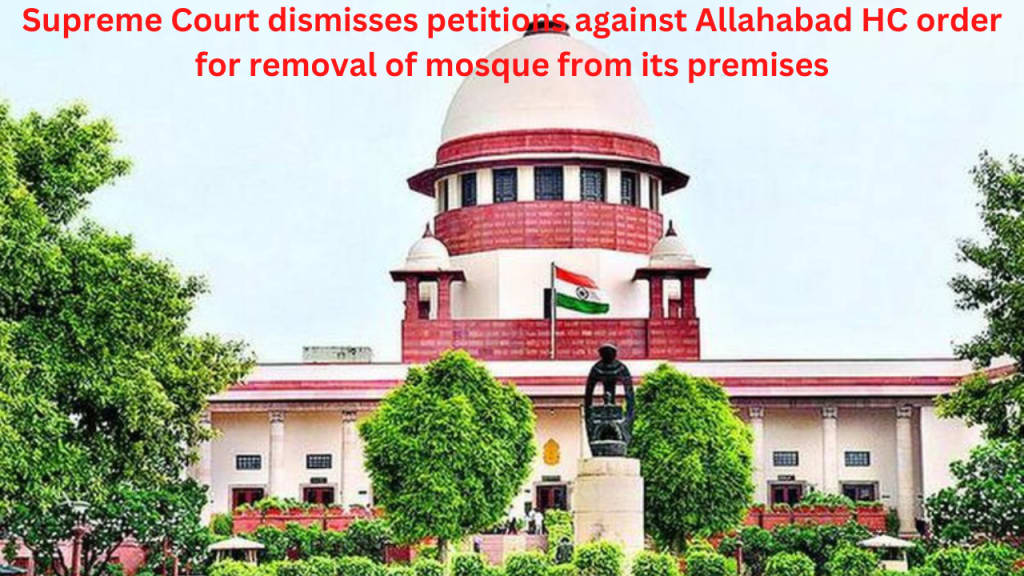Supreme Court dismisses petitions against Allahabad HC order for removal of the mosque from its premises: Implications for communal tensions and religious polarization in India
Analyzing the political, social, and legal implications of the Supreme Court's decision on the Ayodhya land dispute and its impact on religious harmony in India.

In a recent development, the Supreme Court of India dismissed the petitions filed against the Allahabad High Court order for the removal of a mosque from its premises. The decision comes as a landmark ruling in the ongoing dispute over the ownership of the land, which has been a contentious issue for several decades.
The dispute began in the 19th century when a group of Hindus claimed that the site in question was the birthplace of Lord Ram, a revered deity in the Hindu religion. The dispute over the site continued for over a century, with both Hindu and Muslim communities staking their claim to the land. The issue finally came to a head in 1992 when a group of Hindu activists demolished the Babri Masjid, a mosque built on the site, sparking off riots across the country.
The incident led to a long legal battle, with various courts hearing petitions and appeals from both sides. In 2010, the Allahabad High Court gave its verdict, ordering that the land be divided into three parts, with one part going to the Sunni Waqf Board, one to the Nirmohi Akhara, a Hindu sect, and the third to the Hindu parties. The ruling was based on a historical survey of the site that found evidence of a Hindu temple beneath the mosque.
While the Hindu parties accepted the verdict, the Sunni Waqf Board and some other Muslim groups challenged the decision in the Supreme Court, arguing that the mosque had been in place for centuries and was an integral part of their religious heritage. However, after years of hearings and arguments, the Supreme Court upheld the Allahabad High Court order, paving the way for the removal of the mosque.
The decision has been met with mixed reactions from various quarters. Some Muslim groups have criticized the ruling, calling it a blow to religious freedom and an infringement of their rights. On the other hand, the Hindu parties have welcomed the verdict, hailing it as a vindication of their claims to the land.
In the aftermath of the decision, it is important to remember that the dispute over the site has been a source of tension and conflict between communities for decades. The Supreme Court's decision should be seen as an opportunity for both sides to move on from the past and work towards building a more harmonious future.
The Indian Constitution guarantees freedom of religion to all citizens, and it is important that this right is respected and protected. At the same time, it is equally important to respect the rule of law and the decisions of the judiciary. In this case, the Supreme Court has given its verdict after hearing both sides and considering all the evidence. It is incumbent upon all parties to accept the decision and work towards a peaceful resolution of the dispute.
The dispute over the ownership of the land in Ayodhya has been a contentious issue in Indian politics for decades. The decision of the Supreme Court is expected to bring closure to the long-standing dispute, which has resulted in violence and communal tensions in the past.
The dispute has been a source of tension between the Hindu and Muslim communities, with both sides claiming the land as their own. The Supreme Court's decision is likely to be seen as a victory for the Hindu parties, who have been demanding the construction of a temple on the site. However, the Muslim community is likely to be disappointed by the verdict.
The decision is also significant from a legal perspective. The Supreme Court's verdict reaffirms the principle that the rule of law should prevail over any other consideration, including religious beliefs. The Court's decision is based on an objective assessment of the evidence, which includes historical and archaeological evidence.
The verdict is also likely to have political implications. The decision is likely to be seen as a victory for the ruling Bharatiya Janata Party (BJP), which has been advocating for the construction of a temple on the site. The BJP has made the construction of the temple a key electoral issue in the past, and the verdict is likely to be seen as a vindication of the party's stance on the issue.
However, the decision is not without its critics. Some legal experts have questioned the validity of the archaeological evidence used by the court to arrive at its verdict. There are also concerns that the verdict could lead to further communal tensions in the country.
It is important to note that the Supreme Court's decision is final and binding. The parties involved in the dispute must respect the decision and work towards finding a peaceful resolution to the issue. It is also important for the government to ensure that there is no violence or unrest in the aftermath of the verdict.
The Supreme Court's decision is also likely to have implications for the larger issue of communal tensions and religious polarization in India. The dispute over the Ayodhya land has been a flashpoint for communal violence in the past, and the Supreme Court's decision is likely to have a bearing on the larger issue of religious harmony in the country.
The decision is likely to be seen as a victory for the Hindu nationalist forces, who have been advocating for the construction of a temple on the site. The issue has been a key electoral plank for the ruling BJP, and the decision is likely to be seen as a vindication of the party's stance on the issue.
However, the decision is also likely to be a disappointment for the Muslim community, who have been fighting for the preservation of the mosque. There are concerns that the decision could lead to a further marginalization of the Muslim community in India and fuel anti-Muslim sentiment.
It is important for the government and other stakeholders to ensure that the decision is not seen as a victory for one community at the expense of another. The decision should be seen as an opportunity for all parties to move on from the past and work towards building a more harmonious and inclusive society.
The government should also take steps to ensure that there is no violence or unrest in the aftermath of the verdict. There have been instances in the past where communal tensions have flared up in the wake of court verdicts, and it is important to ensure that such incidents do not recur.
In conclusion, the Supreme Court's decision to dismiss the petitions against the Allahabad High Court order for the removal of the mosque from its premises is likely to have far-reaching implications for the larger issue of communal tensions and religious polarization in India. The decision should be seen as an opportunity for all stakeholders to move on from the past and work towards building a more harmonious and inclusive society.
About the Creator
Enjoyed the story? Support the Creator.
Subscribe for free to receive all their stories in your feed. You could also pledge your support or give them a one-off tip, letting them know you appreciate their work.






Comments
There are no comments for this story
Be the first to respond and start the conversation.